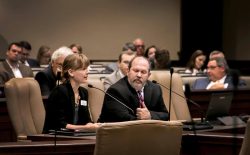
Two staff members of Arkansas Advocates for Children and Families presented recommendations for a smart budget and a state Earned Income Tax Credit to the Tax Reform and Relief Task Force last week. Executive Director Rich Huddleston discussed the state budget and Senior Policy Analyst Eleanor Wheeler explained the many benefits of the EITC and how they fit in with the goals of the task force. Those goals include modernizing the tax code, creating jobs, making Arkansas competitive, and improving fairness. You can read more about the importance of a state EITC and a healthy budget here. Below are some highlights from that conversation:
- AACF explain that the EITC is a very simple way to modernize our tax code. It requires just one line on the income tax form and a set percentage of the federal credit.
- We also argued that it is an important part of making Arkansas more competitive with other states. The EITC will make Arkansas more competitive in a variety of areas, not just business climate and local economic benefits. EITCs improve outcomes for children across the board. Increases in EITCs have been linked to healthier families, more successful students, and better careers decades down the road.
- We explained the importance of EITCs in creating a vibrant job climate. The EITC has been shown to help people move up the income ladder and move out of low-paying jobs. The tax committee asked about how the EITC motivates workers. We explained that, by design, the Earned Income Tax Credit incentivizes additional hours and higher wages because you have to work to get it, and the credit grows as income rises.
- Finally, we emphasized that the EITC is one of the best, cheapest, and most direct ways to improve tax fairness in our state. Under the current tax code in Arkansas, the poorest citizens are paying a higher percentage of their income to state and local taxes than the wealthiest citizens.
Two other groups also presented to the task force, including a representative from the Washington D.C. headquarters of the Council on State Taxation. The President and Executive Director, Douglas Lindhold, argued that corporate taxes impeded economic growth by raising prices, decreasing wages, and decreasing returns for owners. He advocated that reducing corporate income taxes would make Arkansas more competitive at attracting businesses to the area.
Arkansas Advocates has several concerns with this recommendation. As he pointed out in his presentation, the business share of state taxes in Arkansas is about 40%. This is a huge portion of the state revenue that cannot be compromised in a state that is already operating under a tight budget. More concerning, when the tax committee asked for a good example of a state that had seen economic results from tax code changes, the state he chose as a good example was North Carolina. This a very dangerous path to follow. Tax cuts are damaging North Carolina’s state revenue and leaving their K-12 school funding behind pre-recession levels after adjusting for inflation. North Carolina’s college tuition is also up 42% following state cuts, and their schools are having a class-size crisis. The economic results have been underwhelming as North Carolina’s GDP continues to grow at a rate similar to national averages, in addition to the increased burden on its poorest population.
Finally, the Task Force heard from a representative from the National Conference of State Legislatures who gave a presentation comparing the tax code of Arkansas to its neighboring states. An important takeaway from the presentation was that the Arkansas tax code has a relatively high reliance on sales tax compared to other states. A tax code relying on sales tax is a regressive system that places a disproportionate burden on poor working-class families. This is the exact type of tax system that would benefit from an EITC.
The next meetings are scheduled to be at the State Capitol at 1:30 p.m. Thursday, August 31, and at 9 a.m., Thursday, September 7. In the meantime, you can keep up with tax and budget updates from AACF by following us on Twitter and Facebook.
